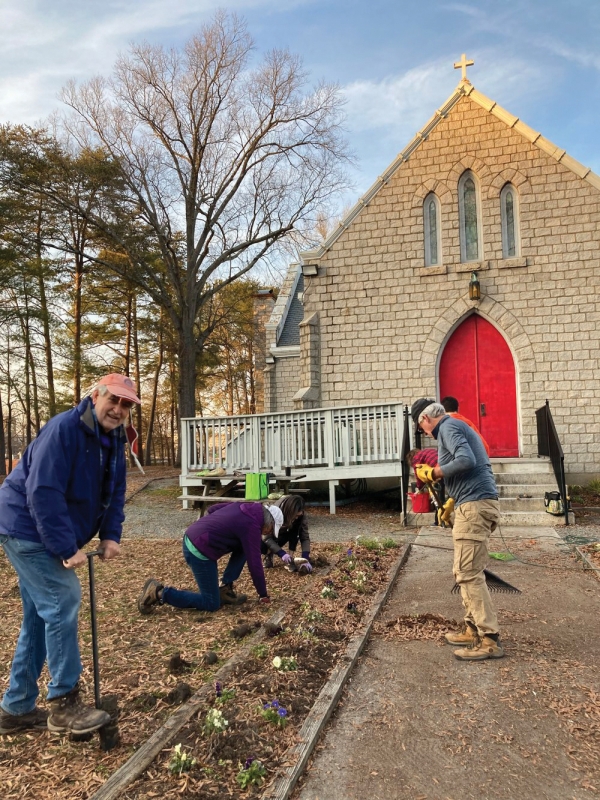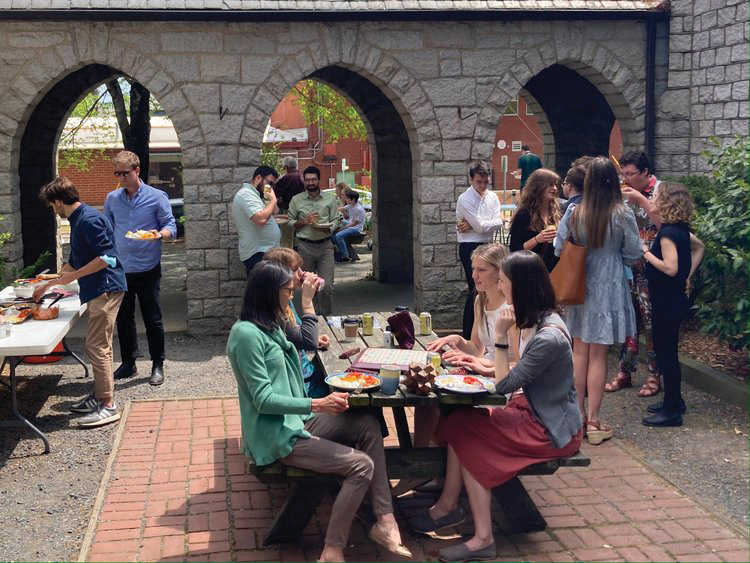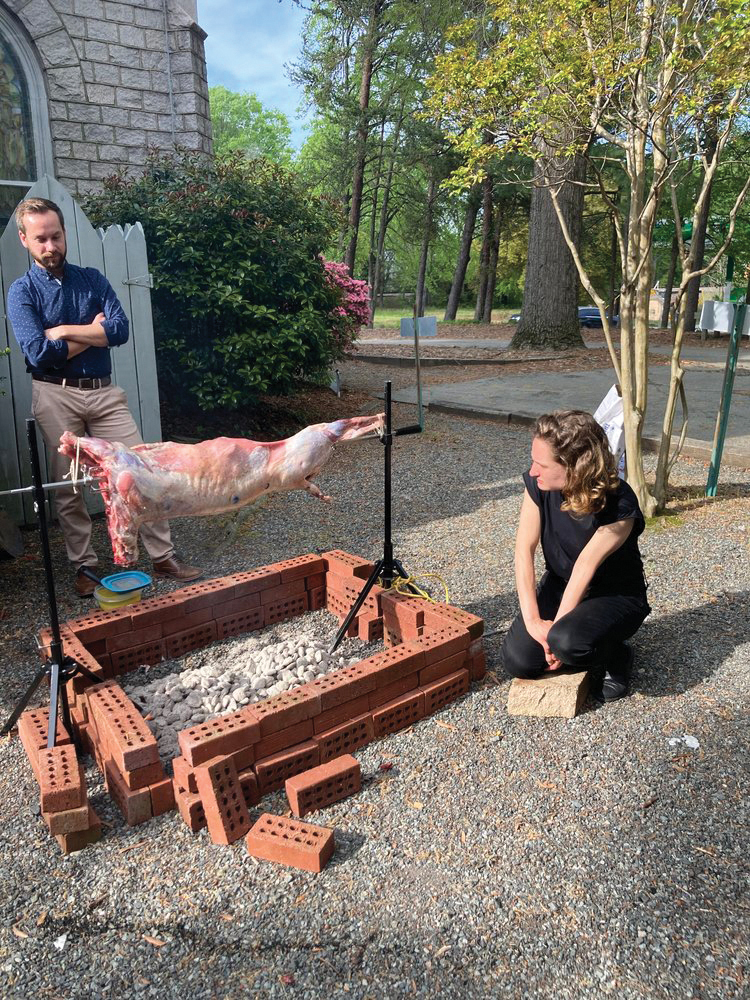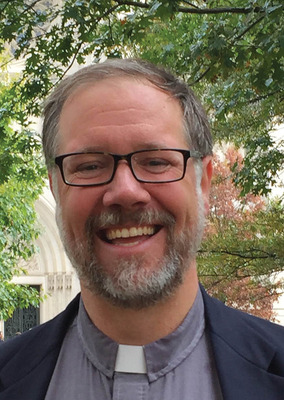Disciple: Doing the Hard Work

How St. Joseph’s, Durham, weathered—and thrived during—the pandemic
By Summerlee Walter
The St. Joseph’s church building is something of an anamoly on its Durham block. Built from beautiful Rowan County granite in a traditional style—arched red door and windows, stained glass, a cross at the peak of the roof—the former mill church’s nearest neighbors are a BP gas station and the crowded parking lot of a commercial plaza containing a Whole Foods and an Edible Arrangements. Located just off of NC Highway 147 near the leafy Duke University East Campus, St. Joseph’s sits on a main thoroughfare through downtown Durham. On a Sunday morning, locals driving by might see the congregation gathered on the front lawn after worship for lemonade and popsicles—or coffee and doughnuts once the weather turns cold. A passerby on foot might stop to inquire what’s going on and be offered a sweet treat and conversation. The next Sunday, they might come to worship.
[Image: Parishioners gather for a work day at St. Joseph’s, Durham, where the entire congregation collaborates to do the work of the church. Photos throughout courtesy of St. Joseph’s]
This is what the people of St. Joseph’s do well: use their gifts for discernment, celebration, and deep, real connection to embrace each other and decide together how to adapt to what’s happening in their neighborhood and the world. Fellowship on the lawn started as a pandemic necessity, an adaptation to keep everyone safe while honoring their need for connection, but evolved into a delightful tradition. This flexibility is an important gift for the congregation, which includes many students and professors from Duke University and its affiliated hospital who might be members for only a few years before moving on to their next position. Long-time members embrace new members, and the small size of the congregation—about 50 people gather to worship each Sunday—means everyone, from graduate students to retirees, knows each other. In that sense, the church is truly intergenerational. The vestry reflects the diversity of the church, with four long-time members and one new members serving on the five-person body.
One of the most remarkable things about St. Joseph’s is the way the church has emerged from COVID-19. The congregation actually grew during the pandemic, with more worshipers now gathering on Sunday mornings than before lockdowns started in spring 2020, and there is a lot of energy in the congregation. They are in the midst of launching a children’s ministry and a prison re-entry team, resuming a lay-initiated, lay-led weekday Taizé-style service, and revamping their website and Instagram presence. This is nothing new for the people of St. Joseph’s, though, who have a long tradition of doing the work, both spiritually and physically, needed to maintain the congregation and its building.
One of the most visible parts of this work is the breakfast ministry, which has served the community in various configurations since 2007. Before COVID-19, members of the community, including many from the local population of people experiencing homelessness, were invited to gather in the parish hall for a hot breakfast each weekday morning. When COVID-19 struck, out of concern for the safety of the medically vulnerable population it served, the communal breakfast went on hiatus, and a drop-by feeding ministry—sausage and egg biscuits, coffee, grits when available and bagged lunches—took its place. As vaccination rates increased and restrictions lifted, St. Joseph’s reintegrated the community aspect of its breakfast ministry as neighbors gathered in a socially distanced circle in the church’s driveway to enjoy breakfast casseroles, sides and coffee. The ministry is led by St. Joseph’s, but volunteers come from across the community. Once per month, anyone who wants to joins a casserole-baking party at vicar the Rev. Dr. Lauren Winner’s house, and others bake in their own kitchens using recipes for grits and turkey casserole or blueberry French toast casserole available on the church’s website.
CELEBRATING AND MOURNING WELL

Gathering around food is a theme at St. Joseph’s. Historically, the church gathered for a feast after the Easter Vigil to break the Lenten fast. This year, though, they decided to try desserts instead. In response to an invitation in the weekly enews, several newcomers to the church, who named themselves the “Baking Magnolias,” cleaned out and beautified the parish house, baked a wide array of delicious desserts, including vegan offerings, and hosted a feast that stretched late into the night. On Easter Sunday, another parishioner arranged to roast a whole lamb on a spit in the church courtyard.
During a recent visioning session, the vestry identified having really good celebrations everyone is welcome to attend as a charism of the church. Winner writes prayers to mark life events and transitions and includes them during the Eucharistic celebration. When a transgender member recently changed his name, the church celebrated with him during worship and afterward. When the church’s diocesan intern finished his internship, the church celebrated. When their former deacon retired, the church celebrated.
[Image: Celebrating well is one of St. Joseph’s charisms, whether that looks like an outdoor coffee hour after church or a lamb roast on Easter Sunday. The community the congregation has built allows for real connection and discernment.]
St. Joseph’s also helps its members mourn. When senior warden Sarah Barton had a complicated miscarriage last fall, both her priest and her church community supported her. “It was a place where I felt I didn’t have to hide that,” she said. “St. Joseph’s is the kind of place where I can mention that and it wasn’t awkward. People didn’t say super trite things; they said meaningful things.
“St. Joseph’s is really good at cultivating a space that allows people to show up as their authentic selves and grieving with people and accompanying people through things that are really hard. And a lot of times they do that through corporate prayer, but then other times it’s just that we’ve cultivated a community where people aren’t told to cover up when they’re upset.”
Like any community, disagreements—about finding a new vicar, about COVID-19 protocols—exist at St. Joseph’s. The depth of relationships among members and the culture of being together in Christian community, however, allows the congregation to talk through disagreements.
“Our commitment to remain together across deep disagreements is a real mark of belonging,” Barton said. “We will stay with you even if we disagree with what you’re saying. We will take your opinion seriously even if it turns out that something doesn’t go the way you wanted it to go, and we’re really concerned that you feel still like you belong here, so let’s have a conversation about how that looks.”
DISCERNING LAY LEADERSHIP
St. Joseph’s has a long history of lay leadership. The church was in the midst of a clergy search during COVID-19, so, without a vicar or an interim, lay leaders took on all the roles, including preaching, to maintain a vibrant worship life over Zoom.
“It was intense; it was the church holding up the grounds and the vestry and doing the search process, but then also having to find supply and, a lot of times, just rely on the lay leadership to have Morning Prayer happen,” Barton explained. “That was an incredible bonding experience, so I think when we came back in person, we had gotten closer to one another. Some people started attending St. Joseph’s on Zoom who had not attended previous to COVID, so it was this amazing thing to be like, ‘I get to meet you in person after two years!’”

“It’s in the DNA of the church,” Winner says of the energy, enthusiasm and flexibility the congregation exhibits. “It’s a very scrappy church. It is a working church.”
Due to its size and embrace of lay ministry in all its forms, there is plenty for everyone to do at St. Joseph’s. The congregation tries to be disciplined, though, about not overwhelming visitors and new members with offers to join committees and volunteer. Instead, it’s a church where, as Barton described it, “it’s easy to see your own calling, to see your own life as a lay minister having a baptismal vocation connected to the work the church is doing.” That ministry might take the form of maintaining the building and grounds, setting up the altar for worship, running the livestream, baking casseroles or helping to start a ministry.
[Image: Celebrating well is one of St. Joseph’s charisms, whether that looks like an outdoor coffee hour after church or a lamb roast on Easter Sunday. The community the congregation has built allows for real connection and discernment.]
“St. Joe’s is very seriously committed to helping people discern the shape of their ministry in our community and in their daily lives as well and takes Christian identity and Christian life really seriously,” Barton said. “It’s not just people interested in ordained ministry or interested in the feeding ministry. I think the Baking Magnolias were exercising their baptismal vocation.”
For Riley Yang, that calling is one of welcome. She moved to Durham in June 2021 and started attending St. Joseph’s in August after a friend invited her to the church’s Feast of St. Phoebe celebration. She said the invitation to find a way to serve shortly after she became a member made her feel like part of the church. Yang decided to volunteer for the altar guild and as an usher. Listening to her talk about the experience, it is clear she found the right ministry for her gifts.
“I love being an usher. I just like saying good morning to people: ‘Good morning and welcome to St. Joe’s.’ It’s like my favorite thing.”
WORSHIP
Like everything else at St. Joseph’s, Sunday morning worship is a communal effort. A dozen or more volunteers gather to set the altar, welcome visitors and pick up doughnuts for coffee hour. A sense of welcome pervades the church.
“Even if I’m kind of dragging myself to church, I get excited with the welcome that Lauren gives to us,” Barton said. “It’s a very welcoming atmosphere supported by Lauren’s words of welcome and genuine, ‘I’m so glad to be in worship with y’all.’”
The preaching also inspires. Winner is a noted and powerful preacher, and she is supported by a strong rota of lay and ordained preachers, many of whom attend Duke Divinity School. Winner, in turn, supports the lay preachers with feedback and formation, and, in the past, the church has even had sermon feedback committees. The dedication to preaching and teaching is one of the strengths that attracts people to St. Joseph’s.
“I always appreciated Bible teaching that is more intellectual, which I found at St. Joe’s, and it’s been really good for my spiritual growth,” Yang explained.
Worship is not only about preaching, of course, and the church pays attention to all aspects of the service. While the deacon is setting the table, the congregation celebrates and uplifts its members with communal prayer. During the announcements, Winner clearly explains the Eucharistic choreography so everyone is included and no one feels lost.
The details of Sunday morning worship could serve as an emblem for everything that works about St. Joseph’s: grounding in the Gospel, attention to the needs of each person, a sense of celebration, and a strong partnership between lay and clergy leaders.
“I don’t think St. Joe’s has the secret sauce,” Barton said. “I think St. Joe’s is doing the hard work of paying attention to the Spirit’s work in our midst, and paying attention to what is bringing life to one another, and joining our efforts with the Spirit’s efforts in trying to be faithful and stick with one another through hardship and get to know each other, even though some of us might leave. We’re trying imperfectly to listen to what each other need, and we’re trying to be honest with each other about our lives before God and our lives together at St. Joe’s and do something about that, not just talk about it.”
Summerlee Walter is the communications coordinator for the Diocese of North Carolina.
 Canon to the Bishop
Canon to the Bishop
 Mission Strategy Coordinator
Mission Strategy Coordinator
 Canon Missioner
Canon Missioner
 Canon Missioner for Black Ministries
Canon Missioner for Black Ministries
 Canon Missioner for Diocesan Restitution and Reparations Ministry
Canon Missioner for Diocesan Restitution and Reparations Ministry
 Canon Missioner for Latino/Hispanic Ministry
Canon Missioner for Latino/Hispanic Ministry
 Transition Ministry Officer
Transition Ministry Officer
